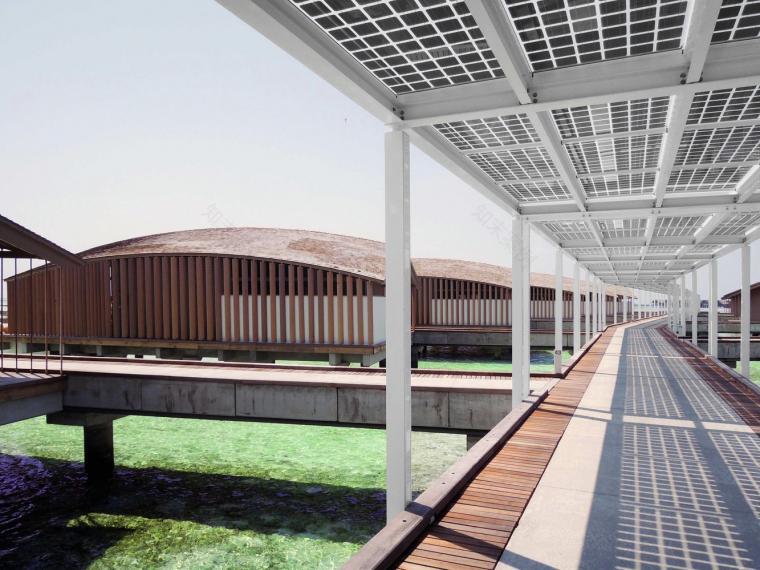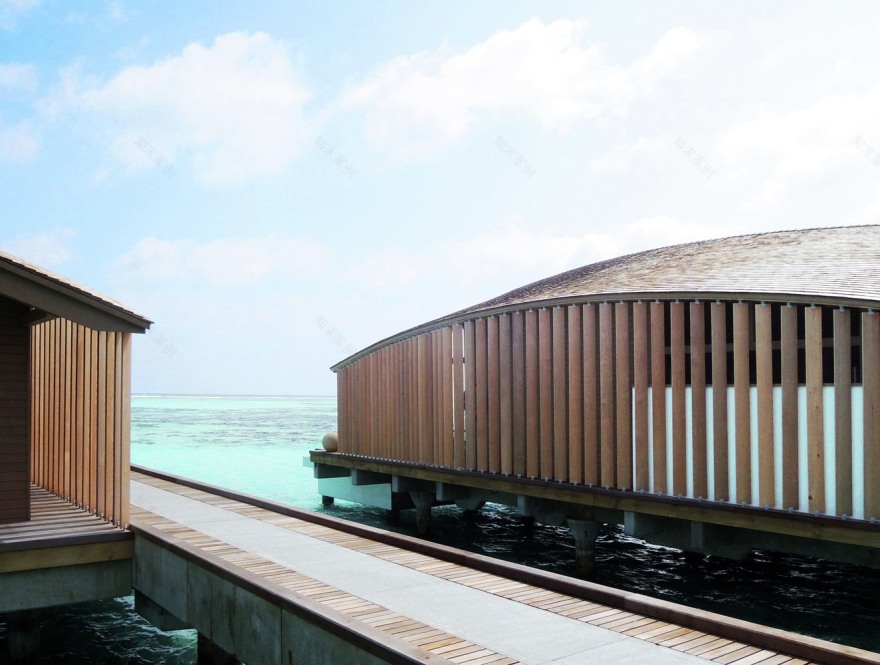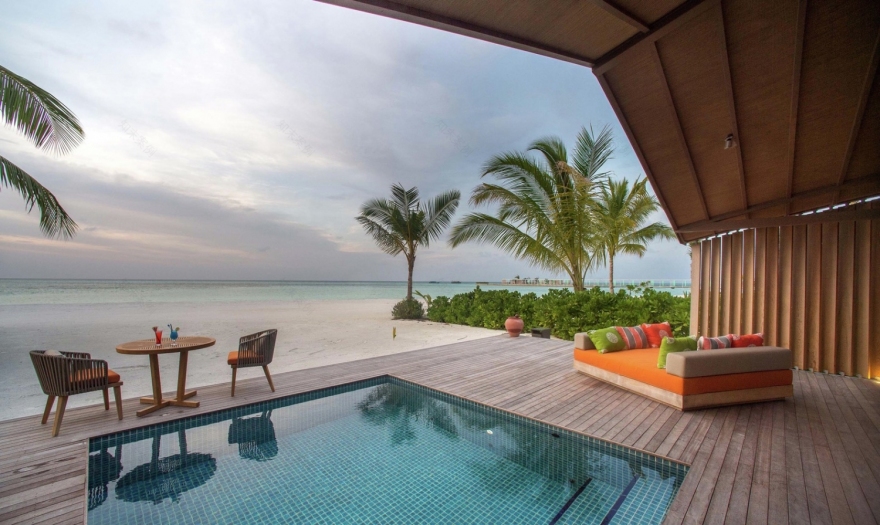查看完整案例


收藏

下载
Maldives Finolhu Villas
设计方:YYA
位置:马尔代夫
分类:别墅建筑
内容:实景照片
承包方:Flight Timbers
委托方:Crown Company Pte. Ltd
图片:15张
这是由YYA设计的Finolhu别墅群。MALE’ ATOLL (Kaafu Atoll) 是马尔代夫首家太阳能供电的五星度假村,现在已经开放。业主表示这是一个100%利用太阳能的项目。而马尔代夫酒店业的先锋Champa Hussain Afeef表示当他们当初看到这座小岛时还只是一个有着椰树的小沙滩。对于这个项目,他表示,“我们希望做一些不同的改变,具有可持续性。我认为可再生能源不只是旅游业的未来,同样也是其他产业的未来。”
这座度假村由纽约建筑师 Yuji Yamazaki 与当地的设计团队共同建造,并且有意大利的工程团队进行参与。这座小岛度假村同时可接待100名游客。游客可以在热带的阳光中嬉戏和玩耍,他们可以看到太阳能是如何在这座小岛上运作的。这座小岛有13公顷,室内面积为123000平房英尺。它具有67000平方英尺的太阳能板,每天的阳光可以在电池中储存一兆瓦的电能,在任何时候都可以满足100名游客和100名工作人员的需求。太阳能电板在小岛上一直都对游客可见,并且融入了所有的建筑设计。花费在太阳能电池板上的费用(包括电池和监控系统)可以在7到8年的时间中收回投资,因为不需要进口汽油。这对于相同气候的其他地区是一个绝好的例子。200人位于这座13公顷的小岛上,人口密度与迈阿密相当。在理论上,迈阿密只需要在12%的屋顶面积上建造太阳能板就可以达到相同的效果,这样整座城市就可以利用太阳能进行供电。
译者:筑龙网艾比
From the architect. MALE’ ATOLL (Kaafu Atoll), The Maldives—The Maldives’ first entirely solar powered five-star resort is now open to guests. The Maldives has the lowest average ground level of any nation, which makes for some of the world’s most beautiful beaches. It also makes Maldivians extremely sensitive to the effects of rising sea levels. The burden of global CO2 reduction lies primarily with a few large economies, but achieving carbon neutrality on this small island should be an inspiration for sustainable development in larger countries. There may be no better place in the world to showcase the future of sustainable resorts than the luxurious tropical setting of Finolhu Villas by Club Med.
The resort opened to the public with a three-day festival of special events, beginning with presentations by Chairman and CEO of Club Med Henri Giscard d’Estang and CEO of Club Med South East Asia Pacific Heidi Kunkel. At the speech given at the ceremony, the owner, the initiator of “100% solar-powered” project, and Maldivian hospitality pioneer Champa Hussain Afeef, recalled how the island was “a simple sandbank with coconut trees when we first saw it.” With this project, he said, “We wanted to do something different and sustainable. I believe renewable energy is not just the future for tourism, but for all other industries as well.”
Designed by New York based architectural firm Yuji Yamazaki Architecture PLLC in partnership with local firm Design 2000 and Italian engineering firm T&D Water Technologies, the island resort will accommodate about 100 guests year round. Guests can relax and enjoy the equatorial sun, and they can also see how solar energy is collected to operate the island. The island is approximately 13 acres with interior space of 123,000 sq. ft. It’s been determined that 67,000 sq ft. of solar panels, with a storage battery generating 1 mega watt on an average sunny day, is sufficient to serve 100 guests and 100 staff occupying the resort at any time. The solar panels are visible to the guests throughout the island and are integrated into all aspects of the resort’s design as an architectural embellishment. The initial investment in the solar system (including the batteries and monitoring system) will be paid off in seven to eight years by eliminating the need to import diesel fuel. This should be a fantastic example for other countries with similar climates. An about two hundred person occupying a 13-acre island is similar to the population density of Miami. In theory, if Miami could delegate just 12% of their land or rooftops to solar panels, the largest city in the “Sunshine State” could be powered entirely by the sun.
Although the solar system generates a surplus of electricity, all guest rooms are designed to minimize energy consumption. The typical guest villa is oriented with operable windows strategically placed, maximizing air ventilation with natural Maldivian wind. Wooden shade screens on two sides of each villa cut off direct sun before reaching the exterior walls and patio, keeping interior temperatures low. The majority of guests typically do not turn on air conditioning during their stay despite the hot and humid climate.
According to Yuji Yamazaki, AIA, and the principal architect: “All resorts in the Maldives are accessed by boats or seaplanes. It is unique to this county that you first see any building in the distance from the sea or sky, which gives the visitors a stunning impression of the entirety of architecture on the island.” Yamazaki intended for the shape of the buildings to suit the uniqueness of the place. For Finolhu Villas, YYA uses gentle curves for all roofs to derive a sense of the organisms that inhabit the tropical environment. “Banana leaf, hermit crab, ocean wave, sea turtle—those are all interesting reference points that guests have pointed out to me after they have observed the resort, but the shape is really a function of efficiency in this case.” says Yamazaki. The design of the surroundings takes inspiration from what was there before. “It is impossible to recreate nature, but we tried our best. The island had beautiful beaches, littoral plantings, coconut groves and interior forests. We kept this basic structure, and also kept the native plant palette such as Sea Lettuce, Iron Wood, Coconut Palm, Beach Hibiscus and Screwpine. When you have a beautiful and unique site like this, you want to just preserve it. Hopefully our new landscape will seamlessly blend with what was there before. Ultimately that’s the main thing that people come to enjoy.”
马尔代夫Finolhu别墅群外部实景图
马尔代夫Finolhu别墅群外部夜景实景图
客服
消息
收藏
下载
最近
































